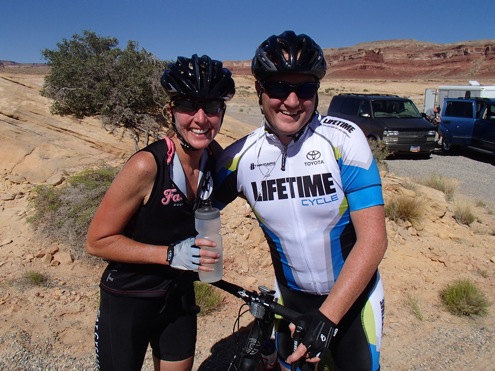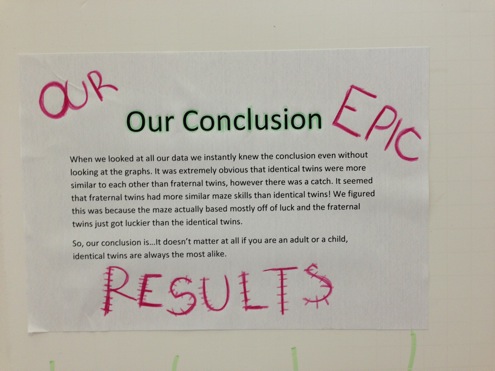What I Know About Fundraising
I didn’t expect to become a guy who’s known for raising money for good causes. I just wanted to write stupid jokes about bikes and have a place where I could publicly shame myself into losing some weight whenever my appetite got out of control.
A while back, though, that changed. Now I’m known more for the good I’ve done in the world than I am for my ad teardowns, my startlingly prescient advice to Lance Armstrong for his screenplay, or my epic shaggy dog masterpiece: Fatty’s Inferno.
Hmph.
Since this has happened, I’ve started getting frequent email requests from people who want advice on how to fundraise for their own cause. In fact, the only more common email message is from people who would like me to do their fundraising for them.
The short answer is, of course, that there’s no real secret to it. What you see me doing on my blog is what I do. All you have to do in order to have the success I’ve had in fundraising is slowly and consistently build a relationship with a growing readership for five years or so, then live a transparent life through a major tragedy, and then spend a big chunk of your life catalyzing your anger into a meaningful legacy.
In other words, it’s not something that you just do during your month-long fundraiser by following some easy steps. It’s something that happened to me, mostly by accident, and now I try to take this power and keep using it for good.
That said, there are some lessons I’ve learned along the way that are probably worth mentioning.
Email Sucks
The laziest form of communication in the whole world is email. It’s radically impersonal. When I get an email solicitation for a donation, I am absolutely perfectly comfortable with ignoring it, because I know exactly how little time went into getting that message to me.
Don’t send an email. Call. Text. Do something outrageous and go see people in person.
Or, if you’ve got to use email, add something personal up top to each email address, so it doesn’t seem like a form letter.
Oh, by the way, the only thing worse than email for asking people to donate is Twitter. When I get a solicitation via Twitter, the first thing I do is check to see what the person’s recent tweets look like. If it’s the same tweet over and over and over, I ignore it, because they weren’t thinking of me.
You may be wondering, “How can a guy who impersonally reaches out using his blog be so grouchy about getting an email? Which is less personal?”
The difference is push vs pull. Push solicitations — anything that comes to you personally (via email or twitter or text or phone call or doorbell) need to be personal. Pull solicitations — when you come to my blog or watch TV or listen to the radio — can’t be, just by their nature, and nobody expects them to be.
So: if you want your fundraising message to work, think about the kind of communication you’re sending, and how personal what the recipient is going to expect the message to be. And work your hardest to make your message a little more personal than they expect.
Oh, and don’t ask other people who have a fundraising track record (e.g., me) to do your fundraising for you. I can personally promise I am doing as much as I can already, and almost certainly don’t believe in your cause as much as you do.
Don’t Apologize
When you ask someone to give you money for your cause, don’t start with:
- “I usually don’t do this kind of thing, but…”
- “I hate it when people send this kind of email, but…”
- “I’m sorry, but…”
Push People Off The Fence
I firmly believe that people want to do good. And people do good things all the time. Most people are, I believe, very nearly altruistic.
I also believe that people are more likely to do good when a smidgen of self-interest is thrown in.
And also, when there is a game involved. Or something funny. Or entertaining.
Something where, in short, their donating money isn’t merely a donation for a good cause, but a doorway to some kind of entertainment. Because sure they might donate anyway, but if you push them off the fence so that their money also gets them entrance into something fun or exciting or silly or odd, then that’s heaping incentive on top of altruism.
Which is maybe an oxymoron, but it works anyway.
Now, some of you might be thinking, “That’s easy for you to say, because you’re able to call companies and ask them for bikes and trips and stuff.”
Which is true. Now.
But it hasn’t always been true.

Way back when this blog was young and I worked for Microsoft and was joining the company team for a ride for MS, I didn’t have any kind of fundraising resume I could pull out and use to get companies to donate awesome swag as an incentive.
But I did have my limbs.
Specifically I put my legs and arms up for “rent” as billboards to anyone who was willing to donate a certain amount. I hit — and blew right by — my fundraising goal.
Or a year ago or so, I wanted to have a contest center around a trip to come to Utah and go riding on my favorite trails. I don’t have an airline sponsor, but I did have some available frequent flyer miles.
My point is, you’ve got resources. Think about what they are. Then use them to show your commitment to what you’re doing.
Your commitment will be contagious.
Don’t Ask People To Donate In Honor of Your Vacation
It’s possible — OK, probable — that this one’s just a pet peeve, but I’m going to throw it out there anyway.
I hate it when people ask me to donate money because they’re going to be going to Italy and riding the Dolomites for awareness of their special cause. Or riding across America. Or wherever. I just see those kinds of things and think, “Why would I give someone money to go on a massive cycling vacation in the name of some charity or other? Why shouldn’t I save my money and spend it on my own cycling vacation?”
Since I’ve never come up with a satisfactory answer to that question, I’m pretty sure I’ve never donated when someone contacts me, asking for money for their monthlong cycling trip.
Don’t Point People Toward Empty Fundraising Pages
When you launch a fundraiser, the chances are your call to action will be to go to a fundraising page and donate. That’s fine.
I don’t know how many times I’ve been to fundraising pages, however — they had me! — to find out that the amount that person had raised, so far was . . . $0.00.
Which means that the person was asking me to donate to a cause he didn’t believe in enough to donate his own money toward.
So, before you ask a single person to help you fundraise, make the first donation yourself. And make it an amount close to the top end of what you’d like to see other people donate. People tend to follow the leader, and people like to see personal commitment.
Avoid Any Possible Impropriety
Don’t have people give money to you. Have them donate directly to the cause you’re raising for. It protects you from tax hassles, and it removes any question of whether you’re in this for the money.
Go For Scale
I don’t know or care whether you like Barack Obama. You’ve got to respect his 2008 campaign for presidency for the fundraising engine it was, and for the way the campaign targeted normal people, asking for $20.
That works for more than just raising money for politicking.
Think about the large organizations you belong to — maybe are even a leader or known figure in. (And if you aren’t part of something, get involved, because donating your time counts for more than donating your money.) And ask those people to help you. Just $20. Or $10. Whatever feels to you like your people couldn’t reasonably say no to.
Consider: $20 x 100 = $2,000.
Yep, really.
Own It
The most important lesson I have for people who are doing fundraising is that you’ve really got to care enough to seriously wring yourself out over it. It’s got to possess you.
Why? Because you have to care about it enough to talk about it instead of talking about something else. You’ve got to care about it enough to ask people for money, and ask unashamedly (people can tell when you’re asking embarrassedly). You’ve got to care about it so much that it pushes your doubts aside and you can no longer even imagine someone not wanting to contribute.
Once you’ve got that mindset, really it’s just a matter of how much you’ll succeed, because when you want to do good that bad, it will infect people and — to some degree or another — you’ll succeed.
You will.

 I want to make a couple of things perfectly clear before getting into this post. Full disclosure kinds of things.
I want to make a couple of things perfectly clear before getting into this post. Full disclosure kinds of things. 









